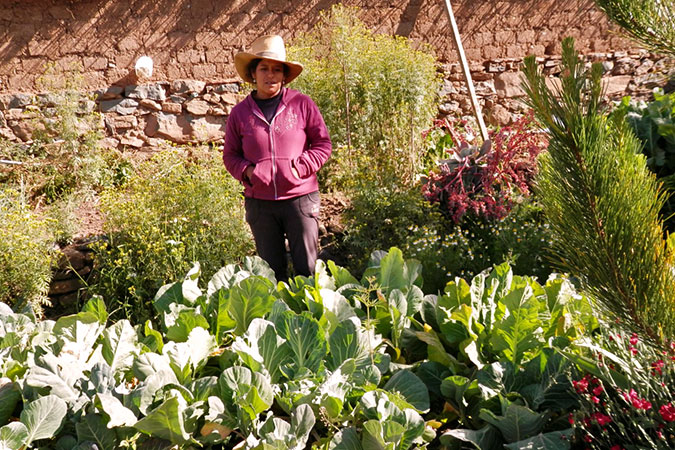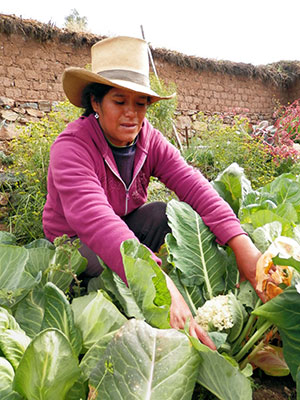Indigenous women in Peru combat climate change and boost economy
To combat the impact of climate change, the indigenous women of Laramate in Peru have turned to ancestral farming techniques with support from UN Women’s Fund for Gender Equality. In addition to healthier crops and improved incomes for the community, the programme has boosted indigenous women’s participation in public spaces and decision-making.Date:

The indigenous farmers of the Laramate district in Peru know what climate change looks like. They saw their crops shrivel in drought and rot under untimely rain and frost. The production suffered and their children were malnourished, until the indigenous women of the farming communities of Atocata, Miraflores, Patachana, Yauca and Tucuta turned to their ancestral techniques of choosing and conserving the seeds and cultivating the land.
The result has been astounding. The fields are now lush with potatoes, olluco, corn, vegetables, fruits and grains, such as kiwicha. The yield is higher and more diverse, the crops are more resilient to frost and drought, and the products are more nutritious.
The women select healthy seeds, rotate the crops to recover soil fertility and irrigate the land more efficiently, using the methods of their ancestors. Since they no longer use agrochemicals, their products taste better and last longer.
“Our land is the only legacy we have. We take care of it as our ancestors would, sowing seeds, but also letting it rest for periods of time,” says 37-year-old Magaly Garayar, resident of the Atocata community and President of OMIL (the Organization of Indigenous Women of Laramate), which is supported by Centro de Culturas Indigenas del Peru (CHIRAPAQ), a grantee of UN Women’s Fund for Gender Equality. CHIRAPAQ strengthens the capacity of indigenous women in the district of Laramate, provides them with training and assistance to improve their economic condition.
Lucia Rupire, also a resident of Atocata and member of OMIL, has memories of her father and grandfather fertilizing the soil with manure from cows, sheep and alpaca. “I started doing the same after the trainings because I understood that the techniques of my ancestors respected the environment while improving fertility of the soil and improving our health. Now we have learned to prepare even better organic manure…my husband is astonished by what we have harvested!”

Improved yield has led to better economy and health for the indigenous families in the area. “In the past we only sowed potatoes, we just ate a bit of wheat… We couldn’t afford buying anything. Now I grow my own vegetables and our food is better because I combine it with vegetables. Part of what I sow, I cook for myself and I sell the rest to earn some money,” shares Carmen Tenorio from the Yauca community.
Magaly Garayar leads a group of 110 women in OMIL who are advocating for the rights of the indigenous women. “Machismo remains present in our communities. Most of the time, men didn’t allow us to participate in events, activities or workshops…Men were the only ones who made decisions. But now our women are speaking out, our authorities listen to us and our opinions are taken into account,” shares Ms. Garayar.
As part of the programme, “Indigenous women defending the Motherland: Economic rights and empowering in Latin America,” funded by UN Women’s Fund for Gender Equality and implemented by CHIRAPAQ, OMIL has also helped indigenous women to commercialize and sell the products in local markets. It has secured the commitment of the local government to support the organization of an agro-ecological fair every month to boost their economy. In addition, the organization helped set up an all-women local dairy business in the Andean region of Ayacucho that has developed a popular brand for cheese, yogurt and other products.
“This programme shows the resourcefulness and resilience of indigenous women. Through the combined use of collective economic structures and appropriate technical support, they have managed to mitigate the impact of climate change and expand economic opportunities, using environmentally sustainable means of production and consumption. This initiative has not only boosted women’s incomes, but also their self-esteem and sense of empowerment,” says Elisa Fernández, Chief of the Fund for Gender Equality. Between 2013 and 2015, the programme has impacted more than 400 women in Peru, increased women’s participation in public spaces and their capacity to influence policies on indigenous women’s economic rights and ending violence against women.